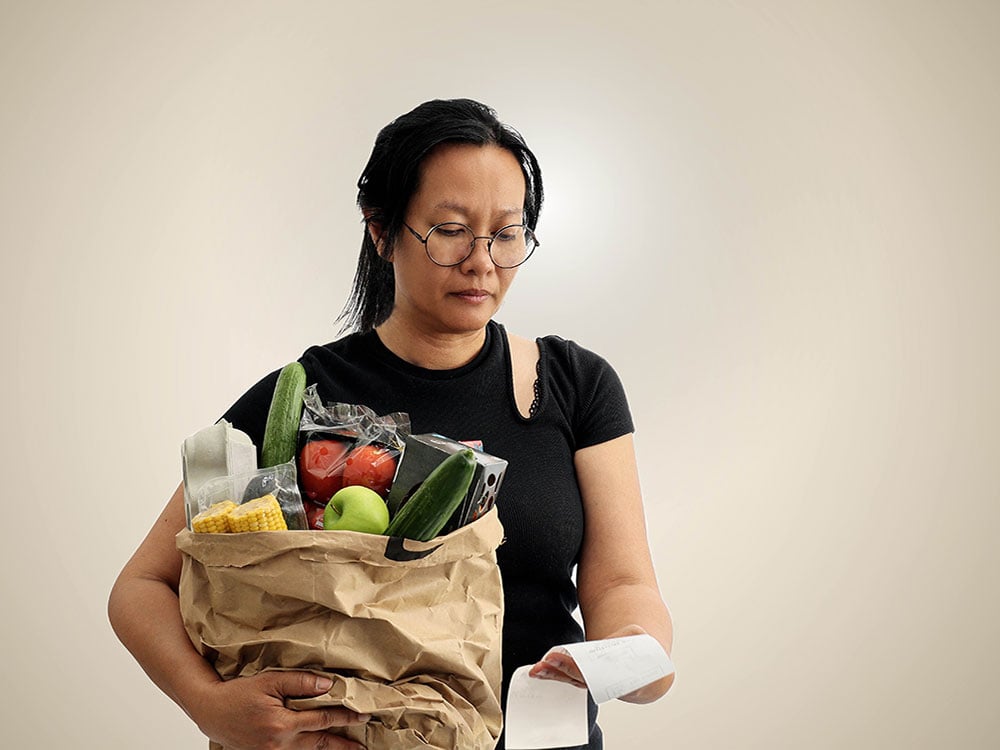The cost of life in British Columbia has risen at a record rate this year as runaway rent and food prices erode savings and squeeze wallets.
The Canadian Centre for Policy Alternatives’ 2022 Working for a Living Wage report found two parents in Metro Vancouver would each need to make $24.08 an hour to afford housing, food, child care and other expenses for a family of four, up 17 per cent from $20.52 in 2021. The minimum wage in B.C. is $15.65.
The result was no surprise to Anastasia French, who said she’s reminded of surging inflation every time she goes to the grocery store.
“The two things that are getting the most expensive are the two things that people can’t afford to cut corners on,” said French, an organizer with Living Wage for Families BC. “That’s food, and that’s housing.”
The jump in Metro Vancouver is the largest CCPA economist Iglika Ivanova has seen since she took a central role in creating the organization’s annual living wage reports in 2010.
The left-leaning policy think tank defines the living wage as what a household with two working adults and two children needs to make ends meet, based on the actual cost of goods and services in a given community. That includes food, housing, child care and some education costs, but does not factor in savings for retirement or buying a home, credit card bills or emergency expenses.
French said the living wage for a person living alone was comparable to a family and that the cost for a single parent would be even higher.
“What this means for living wage employers is wages need to go up, because their employees are facing a much higher cost of living,” Ivanova said.
The biggest expense was housing. The CCPA estimated a hypothetical family of four would spend an average of $2,484 on shelter each month, $355 more than 2021.
Part of that increase is a change in how the CCPA calculates average housing costs. Previously, Ivanova said, they relied on averages provided by the Canada Mortgage and Housing Corp. But she said that figure failed to capture the growing gap between costs for new tenants compared to long-term renters who benefit from rent controls.
“After the methodology was developed in 2008, there wasn’t such a big gap between what new and long-term renters was paying. That emerged in the past 15 years. Now there is a very big difference,” she said.
Even with that change factored in, she said, roughly 70 per cent of the overall cost increases in Metro Vancouver were due to a genuine change in the cost of living.
“We are not really moving the dial on affordable housing for that middle income household in B.C. fast enough,” Ivanova said.
The second culprit was the rising cost of food, which the CCPA calculates based on federal guidelines without factoring in special dietary needs or food preferences. They pegged the monthly cost of food in Metro Vancouver at $1,114 for a family of four, a nearly 17-per-cent increase from 2021.
People across Canada have had sticker shock at the shelves in recent months. Statistics Canada estimates the overall cost of food bought at the store jumped 11 per cent in B.C. from October 2021 to October 2022.
“My family from the U.K. came to visit in May and they were shocked,” French said. “Every day, they were like, ‘Did you know how much this costs?’”
That increase in food prices was even more acute on Vancouver Island. In Greater Victoria, the CCPA estimated the living wage at $24.29 per hour — the first time it has been more expensive there than in Metro Vancouver.
Perhaps surprisingly, the highest projected living wage was in Golden, B.C. Ivanova said that partially reflects high transportation costs and the rising price of fuel. But it was largely driven by the cost of child care. Ivanova said there were only six licensed child-care providers in the community of about 4,000 people and that only one provider participates in the provincial government’s fee reduction program.
Elsewhere, child-care costs were a silver lining in the report. The CCPA estimated the cost of child care rose just one per cent — well below the rate of inflation.
“Child care used to be a very fast-rising cost for families. It used to be the second-highest expense. It was higher than food before the provincial government started making its big investments in 2018,” Ivanova said.
B.C. has signed on to a $30-billion federal program that aims to halve child-care costs by the end of this year and achieve an average $10-a-day fee by 2026. Ivanova said reducing fees by that much would bring the required living wage in Vancouver down by $2.
“There’s a lot there that government can do to make life more affordable,” French said. The living wage campaign has advocated for stronger rent control measures and increased provincial and federal investment in affordable housing.
It also “certifies” employers who pay staff their recommended living wage, who often see that as a way of attracting and retaining staff. Certified employers include the cities of Victoria and Vancouver, the Port of Coquitlam and the Vancouver School Board. All of those employers will eventually need to raise wages to keep that certification, something organizers acknowledge is difficult.
“It is going to be tough for living wage employers. We’re aware of that, and we want to work with them,” French said.
Data from the B.C. government indicate wages in the province aren’t keeping pace with inflation. In 2022, the average weekly pay rate in constant dollars declined every month compared to the same month in 2021, meaning generally that workers’ purchasing power is declining as almost everything gets more expensive.
British Columbia’s government created a commission in 2017 to make recommendations around increases to the minimum wage and, eventually, addressing the discrepancy between the minimum and living wages, but that final report has not yet been released.
Ivanova said fixing the gap would likely require both increases to salaries and government actions to suppress costs.
“We know that employers have been thinking about increasing wages for a variety of reasons. They can see what is happening to rent and grocery prices. But also it has been difficult to staff certain positions, because the wages are too low to cover the cost of living here,” she said. ![]()
Read more: Rights + Justice, Labour + Industry, Housing
















Tyee Commenting Guidelines
Comments that violate guidelines risk being deleted, and violations may result in a temporary or permanent user ban. Maintain the spirit of good conversation to stay in the discussion.
*Please note The Tyee is not a forum for spreading misinformation about COVID-19, denying its existence or minimizing its risk to public health.
Do:
Do not: